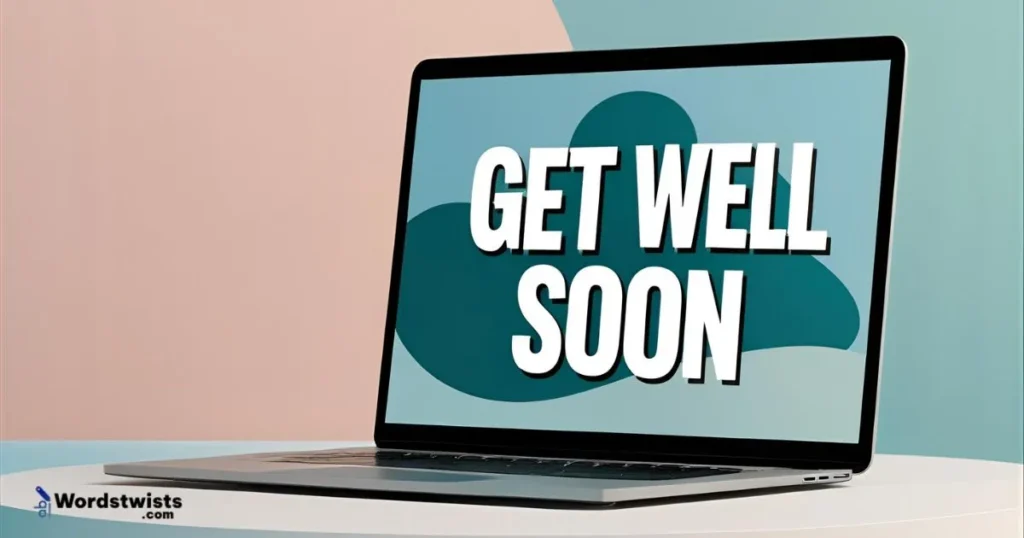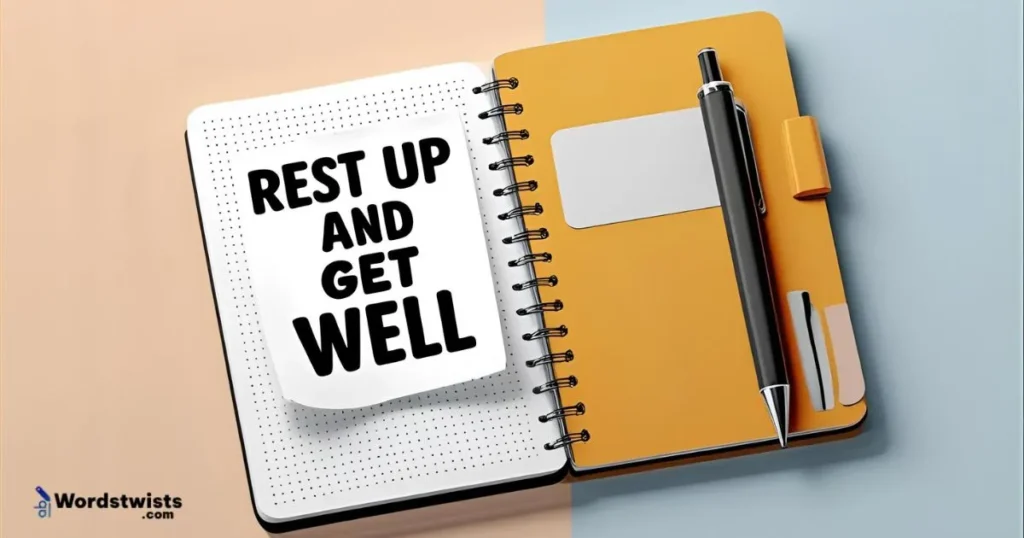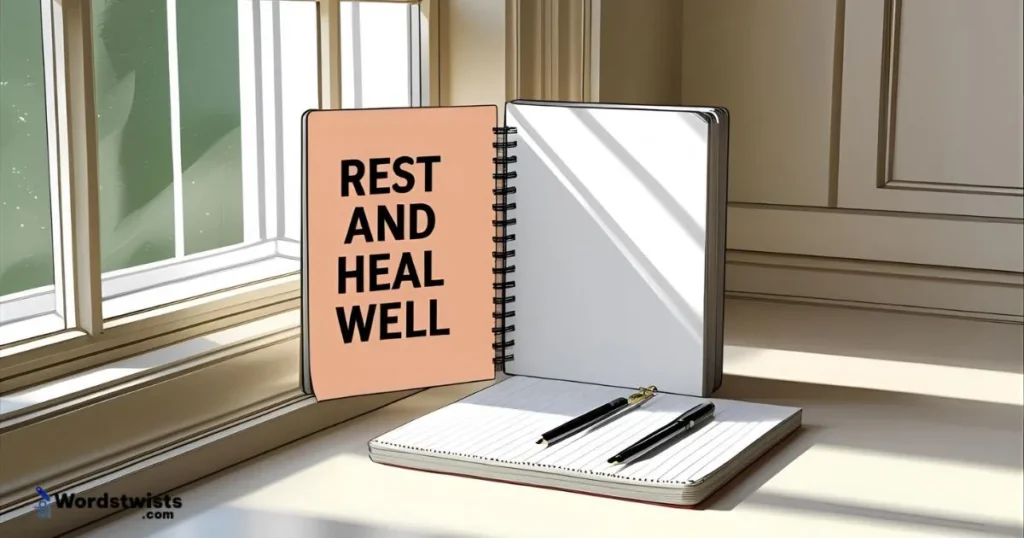We’ve all been there—someone is sick, and the only thing you can think of is saying “Feel better soon.” While it’s a nice gesture, it can get repetitive, and overusing this phrase can make your message feel a little stale. If you’re tired of saying the same thing and want to sound more thoughtful, creative, and personalized, you’re in the right place.
In this post, we’ll explore 25 different ways to say “Feel better soon” that will give your messages a unique touch. Whether you’re sending a message to a friend, family member, or colleague, these alternatives will help you express your care and concern with style and authenticity. Say goodbye to cliches and hello to more meaningful and effective communication.
Ready to level up your vocabulary and improve your communication? Keep reading for fresh, powerful alternatives that will make your words stand out!
Meaning of “Feel Better Soon”
“Feel better soon” is a warm and friendly phrase used to wish someone a quick recovery when they are sick, injured, or feeling down. It’s casual and caring, letting the person know you are thinking of them without being overly formal. It works well in everyday situations with friends, family, or colleagues you are comfortable with.
Is It Nice to Say “I Hope You Feel Better”?
Yes, saying “I hope you feel better” is a kind and thoughtful gesture. It adds a personal touch because it shows you genuinely care about the person’s wellbeing. This phrase is polite and suitable for both casual and slightly more personal conversations, making it a simple way to express concern.
How to Say “Get Well Soon” Professionally
In professional settings, it’s best to use phrases like “Wishing you a speedy recovery,” “Sending my best wishes for your recovery,” or “Hoping for your swift return to good health.” These options maintain a respectful and polite tone while still showing care, making them appropriate for emails, workplace messages, or formal communications.
Synonyms for “Feel Better Soon”
1. Get Well Soon

Explanation:
A simple and classic expression used to wish someone a speedy recovery.
Usage Examples:
- “I hope you get well soon and feel back to yourself.”
- “Take your time and get well soon!”
- “We’re all rooting for you to get well soon.”
- “Wishing you a speedy recovery, and hoping you’ll get well soon!”
- “Get well soon, and don’t rush your healing!”
Why It Works:
“Get well soon” is straightforward, comforting, and universally recognized as a genuine wish for a fast recovery.
2. Wishing You a Speedy Recovery
Explanation:
This phrase emphasizes a quick return to health.
Usage Examples:
- “Take care, and I’m wishing you a speedy recovery!”
- “We all want you back on your feet, wishing you a speedy recovery.”
- “I hope you have a speedy recovery from your surgery.”
- “Remember to rest and focus on your health—wishing you a speedy recovery.”
- “Wishing you strength for a speedy recovery!”
Why It Works:
It conveys hope for a quick recovery while showing empathy for the person’s situation.
3. Hope You Feel Better Soon
Explanation:
A warm and informal expression of sympathy.
Usage Examples:
- “Take it easy, and I hope you feel better soon.”
- “Sending positive thoughts your way, hope you feel better soon.”
- “I’m sure you’ll be up and about in no time—hope you feel better soon.”
- “I’m keeping you in my thoughts and hope you feel better soon.”
- “Take your time, and feel better soon!”
Why It Works:
This phrase feels more personal, offering a supportive tone while maintaining warmth and lightness.
4. Rest Up and Get Well

Explanation:
Encourages the person to rest and prioritize their recovery.
Usage Examples:
- “Take it slow and rest up; get well soon!”
- “Make sure you get plenty of rest—get well soon!”
- “Your health comes first, so rest up and get well.”
- “Take care of yourself and get well as soon as you can.”
- “Don’t worry, we’ll be here when you get well.”
Why It Works:
By focusing on rest and self-care, it gently reminds the person that their health is the top priority.
5. Take Care of Yourself
Explanation:
A caring way to encourage someone to focus on their health.
Usage Examples:
- “I hope you get some much-needed rest—take care of yourself.”
- “Don’t forget to focus on your recovery—take care of yourself.”
- “Wishing you strength and peace during this time. Take care of yourself.”
- “Make sure to take it easy and take care of yourself.”
- “I know it’s tough, but take care of yourself, and everything will be okay.”
Why It Works:
This phrase is both thoughtful and practical, emphasizing self-care and well-being.
Read More: Other Ways to Say “Have a Safe Trip”
6. Wishing You Strength
Explanation:
A phrase that conveys emotional support while wishing for the person’s recovery.
Usage Examples:
- “I’m wishing you strength during your recovery.”
- “You’re strong, and I know you’ll be better soon—wishing you strength.”
- “Take each day at a time; I’m wishing you strength.”
- “I’m confident you’ll overcome this—wishing you strength.”
- “Sending all my thoughts and wishing you strength.”
Why It Works:
It focuses on the emotional aspect of recovery, showing that you’re there to support them through difficult times.
7. I’m Here for You
Explanation:
A phrase of emotional support, letting the person know you’re available to help during their recovery.
Usage Examples:
- “You’re not alone in this. I’m here for you.”
- “Whatever you need, I’m here for you during your recovery.”
- “Rest up, and remember, I’m here for you if you need anything.”
- “Don’t hesitate to reach out—I’m here for you.”
- “Take it easy, and I’m here for you if you need support.”
Why It Works:
This phrase reassures the person that they have a support system and that you are there for them.
8. Take It Easy

Explanation:
A gentle suggestion to rest and recover at a comfortable pace.
Usage Examples:
- “Take it easy and give your body time to heal.”
- “Don’t rush your recovery—take it easy.”
- “Remember to take it easy and let your body recover.”
- “It’s okay to rest; take it easy for now.”
- “Wishing you well and encouraging you to take it easy.”
Why It Works:
It’s casual and gentle, making it a soothing reminder to prioritize rest without feeling pressured.
9. Wishing You Quick Healing
Explanation:
A wish for the person to heal as quickly as possible, focusing on the recovery process.
Usage Examples:
- “Sending you lots of positive energy—wishing you quick healing.”
- “Take care, and I’m wishing you quick healing.”
- “Rest up and take care—wishing you quick healing.”
- “Hope your recovery is quick healing.”
- “May your recovery be smooth and quick healing.”
Why It Works:
This alternative offers optimism and focuses on the recovery process, motivating the person to heal quickly.
10. Wishing You Restful Days
Explanation:
A focus on rest and recovery, encouraging a peaceful and restful recovery period.
Usage Examples:
- “I’m wishing you restful days ahead.”
- “Make sure you take the time to rest—wishing you restful days.”
- “You deserve peaceful moments—wishing you restful days.”
- “Focus on your recovery and restful days.”
- “Wishing you lots of restful days to get back to your best.”
Why It Works:
It emphasizes the importance of rest, offering a gentle and soothing sentiment.
11. Hoping You Feel Like Yourself Soon
Explanation:
A comforting wish for someone to regain their usual energy and health.
Usage Examples:
- “Take your time, and I’m hoping you feel like yourself soon.”
- “You’re strong; I’m sure you’ll feel like yourself soon.”
- “Sending healing vibes your way—hoping you feel like yourself soon.”
- “Take care of yourself, and I hope you feel like your old self again soon.”
- “Wishing you all the best, hoping you feel like yourself soon.”
Why It Works:
This phrase conveys a desire for the person to return to their normal, healthy state, which is uplifting and hopeful.
12. Wishing You Comfort

Explanation:
A phrase that focuses on the person’s emotional and physical comfort during their recovery.
Usage Examples:
- “I’m wishing you comfort as you recover.”
- “May you find peace and comfort during this time.”
- “I hope you’re surrounded by love and comfort while you heal.”
- “Sending you warm thoughts and wishing you comfort.”
- “Take your time, and wishing you comfort and peace.”
Why It Works:
It brings a sense of calm and compassion to the conversation, offering comfort both physically and emotionally.
13. I Hope You’re Feeling Better Each Day
Explanation:
A phrase that wishes for a gradual and steady improvement in health.
Usage Examples:
- “I’m sure you’re feeling better each day—take care!”
- “I hope you’re feeling better each day as you recover.”
- “Wishing you continued progress and feeling better each day.”
- “I know you’ll be stronger every day, feeling better each day.”
- “Take it easy, and I hope you’re feeling better each day.”
Why It Works:
This shows patience and optimism, emphasizing that progress, no matter how small, is important in recovery.
14. Sending You Healing Thoughts
Explanation:
A phrase that conveys spiritual or emotional support, offering good wishes for the person’s recovery.
Usage Examples:
- “I’m sending you healing thoughts during this time.”
- “Hope you’re surrounded by positivity—sending you healing thoughts.”
- “Wishing you peace and recovery, sending you healing thoughts.”
- “Take your time—sending you healing thoughts every day.”
- “You’re in my thoughts as I’m sending you healing thoughts.”
Why It Works:
It offers emotional and mental support, sending the person positive energy and good wishes.
15. Hope Your Recovery Is Smooth
Explanation:
A simple wish for a seamless and uncomplicated recovery.
Usage Examples:
- “Take care, and I hope your recovery is smooth.”
- “Wishing you strength for a smooth recovery.”
- “Hope everything goes smoothly—hope your recovery is smooth.”
- “You’ve got this! Hope your recovery is smooth.”
- “Wishing you peace and that your recovery is as smooth as possible.”
Why It Works:
It keeps things optimistic, wishing for no complications in the person’s recovery process.
Discover: Other ways to say Happy to Announce
16. Rest and Recover
Explanation:
A straightforward and caring message to remind the person to take time to heal.
Usage Examples:
- “Just focus on resting and recovering—take your time.”
- “I’m wishing you all the best while you rest and recover.”
- “Take it slow and remember to rest and recover.”
- “Your health is the most important thing—rest and recover.”
- “I hope you get the rest you need to recover.”
Why It Works:
Simple and effective, this phrase promotes self-care and allows the person to focus on their healing.
17. Wishing You a Healthy Return to Full Strength
Explanation:
A more formal wish is that the person returns to full health quickly.
Usage Examples:
- “Take care, and I’m wishing you a healthy return to full strength.”
- “You’ll be back on your feet soon—wishing you a healthy return to full strength.”
- “I hope your recovery is fast and that you have a healthy return to full strength.”
- “Wishing you a speedy and healthy return to full strength.”
- “Take it slow and remember, wishing you a healthy return to full strength.”
Why It Works:
This phrase is a powerful way to express hope for the person’s complete recovery, using more formal language.
18. Hope You’re Back to 100% Soon
Explanation:
A wish for the person to return to full health and energy soon.
Usage Examples:
- “I hope you’re back to 100% soon!”
- “Take care, and I can’t wait to see you back to 100%.”
- “You’re going to feel amazing once you’re back to 100%.”
- “Wishing you strength and that you’re back to 100% as soon as possible.”
- “Take your time, but I hope you’re back to 100% soon.”
Why It Works:
It uses an energetic and encouraging tone, wishing for a complete recovery to the person’s best self.
19. Rest and Heal Well

Explanation:
A gentle reminder to rest and focus on the healing process.
Usage Examples:
- “Wishing you all the best as you rest and heal well.”
- “Take care of yourself—rest and heal well.”
- “I hope you get plenty of rest so you can heal well.”
- “Take time for yourself, and rest and heal well.”
- “We’re all hoping you rest and heal well.”
Why It Works:
This phrase is gentle, prioritizing both physical and emotional healing during the recovery process.
20. I’m Rooting for You
Explanation:
A phrase of encouragement and support, letting the person know you’re cheering them on.
Usage Examples:
- “I’m rooting for you to feel better soon!”
- “Stay strong, we’re all rooting for you.”
- “You’ve got this—I’m rooting for you all the way.”
- “Rooting for you to get back to full health.”
- “Don’t give up—I’m rooting for you.”
Why It Works:
It gives a sense of optimism and support, showing that you’re emotionally invested in their recovery.
21. May You Find Peace in Your Healing
Explanation:
A thoughtful phrase that focuses on finding mental peace during the recovery process.
Usage Examples:
- “May you find peace in your healing.”
- “Sending you calm and healing thoughts—may you find peace.”
- “Hope your recovery journey brings you both peace and strength.”
- “Take your time, and may you find peace in your healing.”
- “Wishing you rest and peace in your healing.”
Why It Works:
It offers a spiritual or calming sentiment, helping the person mentally and emotionally during recovery.
22. Get Better in Your Own Time
Explanation:
A reassuring phrase reminding the person there’s no rush in recovery.
Usage Examples:
- “Don’t rush yourself, get better in your own time.”
- “Take it easy—get better in your own time.”
- “Healing takes time, and I’m hoping you get better in your own time.”
- “Get better in your own time—there’s no need to hurry.”
- “Take your time, and focus on yourself—get better in your own time.”
Why It Works:
This phrase emphasizes patience, giving the person the freedom to heal at their own pace.
Read More: Other ways to say “looking forward to meeting you”
23. Take Time to Heal
Explanation:
A gentle reminder that healing should be a priority without feeling rushed.
Usage Examples:
- “You deserve the time to rest—take time to heal.”
- “Focus on yourself and take time to heal.”
- “Don’t rush it—take time to heal and come back stronger.”
- “I’m hoping you take time to heal fully.”
- “Take time to heal; we’re all thinking of you.”
Why It Works:
It’s a compassionate reminder that recovery is a personal process and should be done at their own pace.
24. May Your Strength Return Quickly
Explanation:
A powerful wish for a quick recovery, emphasizing physical strength.
Usage Examples:
- “May your strength return quickly as you recover.”
- “Take it easy, but I hope your strength returns quickly.”
- “You’re a fighter, and may your strength return quickly.”
- “Sending good wishes for your strength to return quickly.”
- “Wishing you a fast recovery, and may your strength return quickly.”
Why It Works:
This phrase emphasizes physical strength and resilience, helping the person feel empowered during their recovery.
25. Hoping You’re Restored to Health Soon
Explanation:
A more formal, caring wish for a full recovery.
Usage Examples:
- “Hoping you’re restored to health soon.”
- “Take care, and we’re hoping you’re restored to health soon.”
- “I hope you’re restored to health soon and back on your feet.”
- “Sending you positive vibes, and hoping you’re restored to health soon.”
- “Wishing you strength, and hoping you’re restored to health soon.”
Why It Works:
It expresses a well-rounded, formal wish for complete restoration of health.
Conclusion
These 25 compelling alternatives to “Feel better soon” will help you express your good wishes with flair and warmth. Whether you’re trying to sound more creative or just want to move beyond the usual phrase, these options will elevate your communication. Each alternative brings something unique to the table, allowing you to choose the perfect phrase based on the context and relationship with the person.
Try using these alternatives to enhance your vocabulary and communicate with more depth and authenticity. By expanding your word choices, you’ll be able to connect with others in a more meaningful way. So, next time someone is under the weather, don’t just say “Feel better soon”—use one of these powerful alternatives and make your words stand out!

I’m Leo Knox, the wordplay wizard behind WordsTwists.com where I turn everyday meanings into funny, clever, and creative twists. If you’re tired of saying things the boring way, I’ve got a better (and funnier) one for you!


